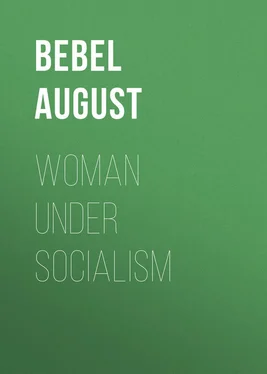August Bebel - Woman under socialism
Здесь есть возможность читать онлайн «August Bebel - Woman under socialism» — ознакомительный отрывок электронной книги совершенно бесплатно, а после прочтения отрывка купить полную версию. В некоторых случаях можно слушать аудио, скачать через торрент в формате fb2 и присутствует краткое содержание. ISBN: , Жанр: foreign_antique, foreign_prose, на английском языке. Описание произведения, (предисловие) а так же отзывы посетителей доступны на портале библиотеки ЛибКат.
- Название:Woman under socialism
- Автор:
- Жанр:
- Год:неизвестен
- ISBN:http://www.gutenberg.org/ebooks/30646
- Рейтинг книги:5 / 5. Голосов: 1
-
Избранное:Добавить в избранное
- Отзывы:
-
Ваша оценка:
- 100
- 1
- 2
- 3
- 4
- 5
Woman under socialism: краткое содержание, описание и аннотация
Предлагаем к чтению аннотацию, описание, краткое содержание или предисловие (зависит от того, что написал сам автор книги «Woman under socialism»). Если вы не нашли необходимую информацию о книге — напишите в комментариях, мы постараемся отыскать её.
Woman under socialism — читать онлайн ознакомительный отрывок
Ниже представлен текст книги, разбитый по страницам. Система сохранения места последней прочитанной страницы, позволяет с удобством читать онлайн бесплатно книгу «Woman under socialism», без необходимости каждый раз заново искать на чём Вы остановились. Поставьте закладку, и сможете в любой момент перейти на страницу, на которой закончили чтение.
Интервал:
Закладка:
It is noteworthy that the efforts here roughly sketched, do not reach beyond the frame-work of the existing social order. The question never is put whether, these objects being attained, any real and thoroughgoing improvement in the condition of woman will have been achieved. Standing on the ground of bourgeois, that is, of the capitalist social order, the full social equality of man and woman is considered the solution of the question. These folks are not aware, or they slide over the fact that, in so far as the unrestricted admission of woman to the industrial occupations is concerned, the object has already been actually attained, and it meets with the strongest support on the part of the ruling class, who as will be shown further on, find therein their own interest. Under existing conditions, the admission of women to all industrial occupations can have for its only effect that the competitive struggle of the working people become ever sharper, and rage ever mere fiercely. Hence the inevitable result, – the lowering of incomes for female and male labor, whether this income be in the form of wage or salary.
That this solution cannot be the right one is clear. The full civic equality of woman is, however, not merely the ultimate object of the men, who, planted upon the existing social order, favor the efforts in behalf of woman. It is also recognized by the female bourgeois, active in the Woman Movement. These, together with the males of their mental stamp, stand, accordingly, with their demands in contrast to the larger portion of the men, who oppose them, partly out of old-fogy narrowness, partly also – in so far as the admission of woman to the higher studies and the better-paid public positions is concerned – out of mean selfishness, out of fear of competition. A difference in principle, however, a class difference, such as there is between the working and the capitalist class, does not exist between these two sets of male and female citizens.
Let the by no means impossible case be imagined that the representatives of the movement for the civic rights of woman carry through all their demands for placing woman upon an equal footing with man. What then? Neither the slavery, which modern marriage amounts to for numberless women, nor prostitution, nor the material dependence of the large majority of married women upon their marital lords, would thereby be removed. For the large majority of women it is, indeed, immaterial whether a thousand, or ten thousand, members of their own sex, belonging to the more favored strata of society, land in the higher branches of learning, the practice of medicine, a scientific career, or some government office. Nothing is thereby changed in the total condition of the sex.
The mass of the female sex suffers in two respects: On the one side woman suffers from economic and social dependence upon man. True enough, this dependence may be alleviated by formally placing her upon an equality before the law, and in point of rights; but the dependence is not removed. On the other side, woman suffers from the economic dependence that woman in general, the working-woman in particular, finds herself in, along with the workingman.
Evidently, all women, without difference of social standing, have an interest – as the sex that in the course of social development has been oppressed, and ruled, and defiled by man – in removing such a state of things, and must exert themselves to change it, in so far as it can be changed by changes in the laws and institutions within the frame-work of the present social order. But the enormous majority of women are furthermore interested in the most lively manner in that the existing State and social order be radically transformed, to the end that both wage-slavery, under which the working-women deeply pine, and sex slavery, which is intimately connected with our property and industrial systems, be wiped out.
The larger portion by far of the women in society, engaged in the movement for the emancipation of woman, do not see the necessity for such a radical change. Influenced by their privileged social standing, they see in the more far-reaching working-women's movement dangers, not infrequently abhorrent aims, which they feel constrained to ignore, eventually even to resist. The class-antagonism, that in the general social movement rages between the capitalist and the working class, and which, with the ripening of conditions, grows sharper and more pronounced, turns up likewise on the surface of the Woman's Movement; and it finds its corresponding expression in the aims and tactics of those engaged in it.
All the same, the hostile sisters have, to a far greater extent than the male population – split up as the latter is in the class struggle – a number of points of contact, on which they can, although marching separately, strike jointly. This happens on all the fields, on which the question is the equality of woman with man, within modern society. This embraces the participation of woman in all the fields of human activity, for which her strength and faculties are fit; and also her full civil and political equality with man. These are very important, and as will be shown further on, very extensive fields. Besides all this the working woman has also a special interest in doing battle hand in hand with the male portion of the working class, for all the means and institutions that may protect the working woman from physical and moral degeneration, and which promise to secure to her the vitality and fitness necessary for motherhood and for the education of children. Furthermore, as already indicated, it is the part of the working-woman to make common cause with the male members of her class and of her lot in the struggle for a radical transformation of society, looking to the establishment of such conditions as may make possible the real economic and spiritual independence of both sexes, by means of social institutions that afford to all a full share in the enjoyment of all the conquests of civilization made by mankind.
The goal, accordingly, is not merely the realization of the equal rights of woman with man within present society, as is aimed at by the bourgeois woman emancipationists. It lies beyond, – the removal of all impediments that make man dependent upon man; and, consequently, one sex upon the other. Accordingly, this solution of the Woman Question coincides completely with the solution of the Social Question. It follows that he who aims at the solution of the Woman Question to its full extent, is necessarily bound to go hand in hand with those who have inscribed upon their banner the solution of the Social Question as a question of civilization for the whole human race. These are the Socialists, that is, the Social Democracy.
Of all existing parties in Germany, the Social Democratic Party is the only one which has placed in its programme the full equality of woman, her emancipation from all dependence and oppression. And the party has done so, not for agitational reasons, but out of necessity, out of principle. There can be no emancipation of humanity without the social independence and equality of the sexes.
Up to this point all Socialists are likely to agree with the presentation made of fundamental principles. But the same cannot be said on the subject of the manner in which we portray the ultimate aims to ourselves; how the measures and special institutions shall be shaped which will establish the aimed-at independence and equality of all members of the sexes, consequently that of man and woman also.
The moment the field of the known is abandoned, and one launches out into pictures of future forms, a wide field is opened for speculation. Differences of opinion start over that which is probable or not probable. That which in that direction is set forth in this book can, accordingly, be taken only as the personal opinion of the author himself; possible attacks must be directed against him only; only he is responsible.
Читать дальшеИнтервал:
Закладка:
Похожие книги на «Woman under socialism»
Представляем Вашему вниманию похожие книги на «Woman under socialism» списком для выбора. Мы отобрали схожую по названию и смыслу литературу в надежде предоставить читателям больше вариантов отыскать новые, интересные, ещё непрочитанные произведения.
Обсуждение, отзывы о книге «Woman under socialism» и просто собственные мнения читателей. Оставьте ваши комментарии, напишите, что Вы думаете о произведении, его смысле или главных героях. Укажите что конкретно понравилось, а что нет, и почему Вы так считаете.












